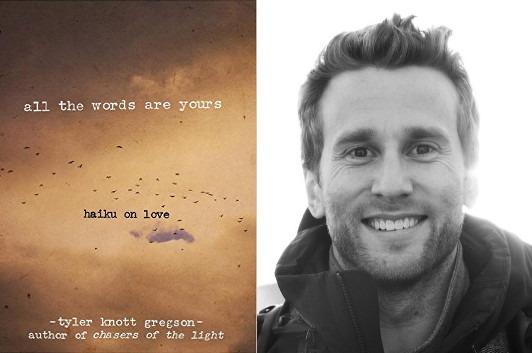Tyler Knott Gregson: When I Heard Walt Whitman

photo via Tyler Knott Gregson
Every day, Tyler Knott Gregson writes a haiku on an old typewriter, and then shares it with fans online. And there’s a lot of them: hundreds of thousands spread out between Tumblr and Instagram alone, with more on other social media platforms. All the Words Are Yours collects some of what he’s shared online along with new work, plus some choice examples of his photography (that’s his day job). “I don’t ever want to be taught how to do something artistic, no matter what it is,” he once told an interviewer, “because I’m always worried that if I’m taught how to do it, I’ll do it like the person that taught me.” But, as you’ll learn in this guest post, inspiration is quite a different matter…
It was one, always one, that pushed me into love. I say pushed because it was forceful, it was unseen, and it took the wind out of me. I had read a few before, poems I was instructed to, guided through, and tested on, but none stuck. None felt whilst reading, how I felt while sitting, staring at blank blackboards, counting every tick of every clock within earshot, waiting for the classes to end. Then it came, as suddenly as the joy rises in his work, as clearly as his observation, and I was pushed into love.
Walt Whitman may seem like a cliché choice to mention as a poet that has helped shape the writer, and more, the man I am today, but like all great clichés, it’s true, and it’s honest. When I first read “When I Heard The Learn’d Astronomer,” something, and maybe it was the first something, made sense, and I for the first time felt like I did, as well. Being taught was something I struggled with, attention span lacks and boredom were things that I wrestled with every day of my school career, and reading this poem served as an introduction not only to Whitman and his entire way of seeing the world, but of being understood by someone, somewhere, even long since gone. Since the first reading, and every time I read it still, it makes me feel like maybe, just maybe the way I see the world isn’t so strange, that maybe it is okay to find miracles in all the mundane and simple things, that maybe walking in complete amazement at all times is a blessing, and not a curse to be corrected and normalized.
The poem, in my eyes, is one of the most perfect pieces of writing I have ever encountered. It’s concise, while being massively expressive, it’s simple while being extremely resonant, and it ends in a way that I still to this day strive to end my own poems, with a punch to the gut of truth and power. I am a sucker for last lines, I always have been, and the best poems to me always end in such a way that the last bits of breath belonging to your lungs seem to be vacuumed out, fast and complete, leaving you with just enough air in your mouth to mutter out a ‘Wow.’
When I was told about this exercise, many different writers came into my mind, many different poets who dipped their toes into many different styles, but I kept circling back to this poem, to Whitman in particular. Never before him had I read a writer with such a reverence and true joy for the world around him. An observer by nature, he made me understand what it is to see the world, truly see it, with an eye for the hidden details, the small pieces that tell a much bigger story. The me that sits here, typing this, trying to explain the unexplainable that is the effect of a small piece of writing on the fleshless bits inside ourselves, was in many ways, shaped by his words, and his words in this work specifically. He made me make sense, and I don’t know if there’s a word written, by me, by him, or by anyone else, that can define the gratitude I feel for it.
18 October 2015 | poets on poets |

 Our Endless and Proper Work is my new book with Belt Publishing about starting (and sticking to) a productive writing practice.
Our Endless and Proper Work is my new book with Belt Publishing about starting (and sticking to) a productive writing practice. 
